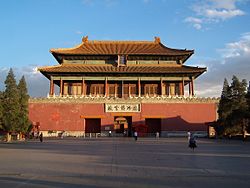Gate of Divine Prowess
| Gate of Divine Prowess | |
|---|---|
神武门 | |
 | |
 | |
| Former names | Black Tortoise Gate |
| Alternative names | Gate of Divine Might |
| General information | |
| Type | Gate |
| Location | Forbidden City |
| Town or city | Beijing |
| Country | China |
| Coordinates | 39°55′15.4″N 116°23′25.5″E / 39.920944°N 116.390417°E |
| Opened | 1420 |
The Gate of Divine Might or Gate of Divine Prowess (simplified Chinese: 神武门; traditional Chinese: 神武門; pinyin: Shénwǔmén, Manchu: ᡧᡝᠨ
ᡠ
ᠮᡝᠨ šen u men) is the northern gate of the Forbidden City in Beijing, China.[1]
History
[edit]
The gate was built in 1420, during the 18th year of Yongle Emperor's reign.[1] The Gate was originally named "Black Tortoise Gate" (玄武門; Xuánwǔmén), but when Qing dynasty's Kangxi Emperor, whose birth name was Xuanye (玄燁), ascended to the throne, the use of the Chinese character Xuan (玄) became a form of naming taboo.[1]
The gate is the back gate of the palace,[1] and was used by palace workers.[1] Women being sent into the palace for selection as concubines also entered the palace through this gate.[1]
It is important to note that the Xuanwu Gate Incident, while sharing a similar name with this gate's original name, did not take place at this gate. The palace coup happened during the Tang dynasty, when the capital was in Chang'an.
References
[edit]External links
[edit] Media related to Gate of Divine Might (Forbidden City) at Wikimedia Commons
Media related to Gate of Divine Might (Forbidden City) at Wikimedia Commons
